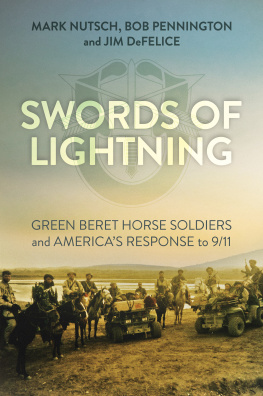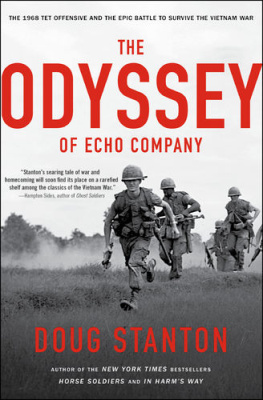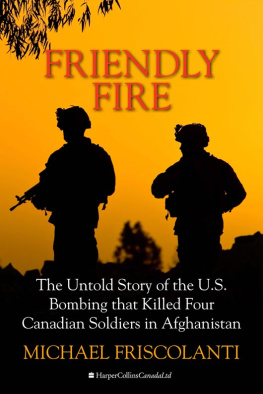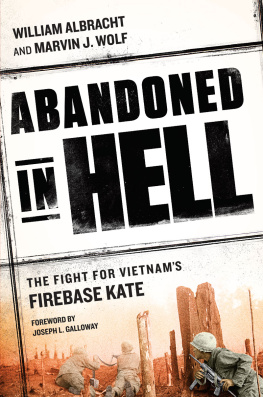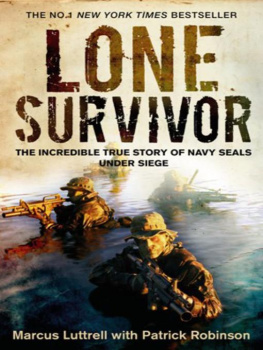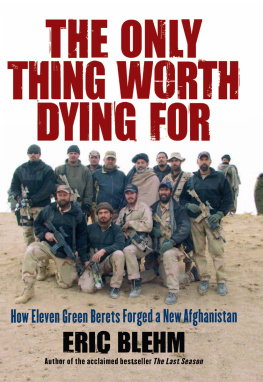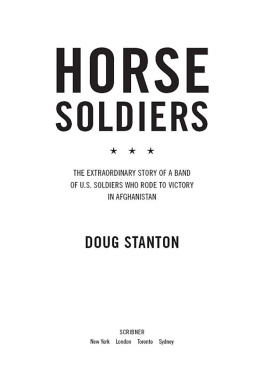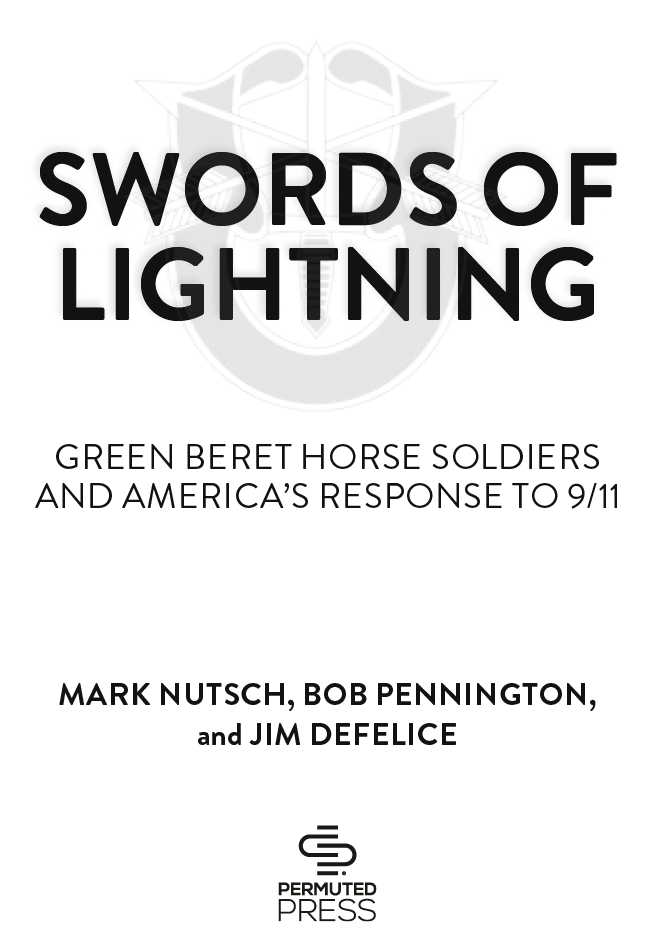
A PERMUTED PRESS BOOK
Swords of Lightning:
Green Beret Horse Soldiers and Americas Response to 9/11
2022 by Mark Nutsch, Bob Pennington, and Jim DeFelice
All Rights Reserved
ISBN: 978-1-63758-153-7
ISBN (eBook): 978-1-63758-154-4
Cover design by Cody Corcoran
Interior design and composition by Greg Johnson, Textbook Perfect
This is a work of nonfiction. All people, locations, events, and situations are portrayed to the best of the authors memory.
No part of this book may be reproduced, stored in a retrieval system, or transmitted by any means without the written permission of the authors and publisher.

Permuted Press, LLC
New York Nashville
permutedpress.com
Published in the United States of America
To the men and families of ODA 595,
the veterans of Task Force Dagger,
and the people of Afghanistan.
Then I heard the voice of the Lord saying,
Whom shall I send? And who will go for us?
And I said, Here am I. Send me!
Isaiah 6:8
Contents
Following the American Withdrawal from Afghanistan
T here were two American wars in Afghanistan.
The first took place in the days following the 9/11 attacks and lasted roughly six weeks.
The second was a nineteen-year war against the reality of Afghanistan.
The wars were only loosely connected. The first was a tremendous victory, one of the greatest unconventional warfare campaigns in history. The second, which may be described as something between nation building and an occupation, ended as most wars against reality do. It was a confusing muddle of which there are many chronicles, with undoubtedly more to come.
This book is about the first war, told from the point of view of two of the men who fought it. Their accomplishmentsand the courage of the militiamen and Americans who participatedwere not negated by the second. If anything, the first war should have informed American leaders how the second should be conductedif it was to be conducted at all.
But we are not writing here to debate policy matters, or even the second, much longer period of the American involvement in Afghanistan. Nor will we discuss the decision to withdraw or its consequences. Still, we feel it necessary to remember, if only briefly, the brave men and their families who worked alongside Americans during both of these wars.
In the weeks before and after the final withdrawal of American troops, the media was filled with stories about the despicable state these individuals found themselves in. A number were helped to freedom, but there were far too many left behind. The great tragedy is that they had been effectively abandoned years before, denied asylum and new lives in America due to bureaucratic ineptitude and criminally negligent administration policies. (And by that, we mean ALL administrations during that period.) While welcome, the eleventh-hour passage of legislation making it easier for some of those who worked with Americans to find safety in the States was both too little and far too late.
This is not the place to dwell on the seemingly endless list of mistakes or dissect the misunderstandings, misdirections, incompetence, and sheer mendacity that wracked Afghanistan following its liberation. At the same time, it has been painful to witness.
The sudden flood of concern in the media begs the question: where was this earlier? Where were the so-called thought leaders when there was an actual chance of affecting changeor, if nothing else, reducing American casualties by withdrawing far earlier?
But this is a book about the first war, and as such, it is a document of victory. It should be remembered that, as great as the American contribution was, the forces who bled most heavily were Afghan. All the different tribes and factions were represented in the revolution that, with U.S. help, eventually unshackled the country from Taliban rule.
It was also a victory that fulfilled, in nearly every possible way, classic Special Forces doctrine. While a number of details remain classified, we have endeavored to lay out the events in a way accessible to both experts and non-experts in the field.
This account will not be the last word on the battles. We expect the war will be studied for decades by military experts and interested civilians, as others have. Accordingly, we have tried to be as candid as possible, writing of mistakes as well as triumphs.
Popular culture has lately promulgated an image of special operations troops as highly muscled, over-equipped ninjas able to leap tall mountains and outrun speeding bullets. As this book will show, that is a false image. To repurpose something an Agency member who was involved said recently, This was a war won by soccer dads.
The statement, at least as it pertains to the Americans on the ground, is true, at least metaphorically. The members of ODA 595, as well as the other ODAs and Agency people, were ordinary human beings. Well-trained, highly motivated human beings, to be sure, but not possessing great superpowers. Many were dads at the time. They did have some high-tech gearor at least gear that was cutting edge at the time. But their main weapons were ancient ones: the ability to communicate with people who shared their goals, though not their culture. The Americans improvised on the fly, persevered in the face of great danger, and compromised when compromising was called for. All of these qualities would have been familiar to Robert Rogers, who led Rogers Rangers during the French and Indian War.
Like the men under Rogers commandand countless other soldiers before and after themthe Americans returned home to farms, towns, and cities when their war was over. There, they contributed and continue to contribute in various, hopefully quieter, ways to American life.
This book is dedicated to them, to their families and loved ones, as well as the Afghans who fought before, after, and alongside them, for freedom.
Jim DeFelice
Americans
Operational Detachment Alpha (ODA) 595, Rank and Specialty
Captain Mark Nutsch Detachment Commander
Chief Warrant Officer 2 Bob Pennington Assistant Detachment Commander
Master Sergeant Paul Team and Operations Sergeant
Sergeant First Class Andy Intelligence Sergeant
Sergeant First Class Steve K. Weapons Sergeant
Staff Sergeant Mike Weapons Sergeant
Staff Sergeant Chad Engineer Sergeant
Staff Sergeant Pete Engineer Sergeant
Sergeant First Class Bill Bennett Medical Sergeant
Sergeant First Class Steve B. Medical Sergeant
Sergeant First Class Vince Communications Sergeant
Staff Sergeant Will Communications Sergeant
Staff Sergeant USAF Steve T. Tactical Air Control Party (TACP)Air Force Air Support Controller
Staff Sergeant USAF Matt Air Force Special Operations Combat Controller from Special Tactics Squadron
Note: As some members of the team remain on active duty or have gone on to other positions where identification might place them in some danger, we have not included the last names of any of the men on the team aside from ourselves. The one exception is Bill Bennett, who was killed in action in Ramadi, Iraq, on September 12, 2003.
While team members are experts in their selected specialties, they cross-train in all areas.
The two Air Force servicemen who joined us came from different units and had different specialties, but while they were working with us, their primary mission was calling in close air support. The common military slang for this job is JTACjoint tactical air controllerand that is how we refer to them in the book.
Next page
